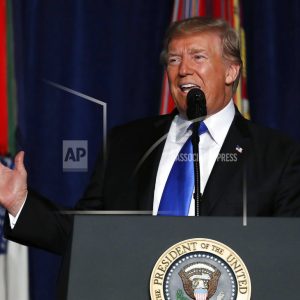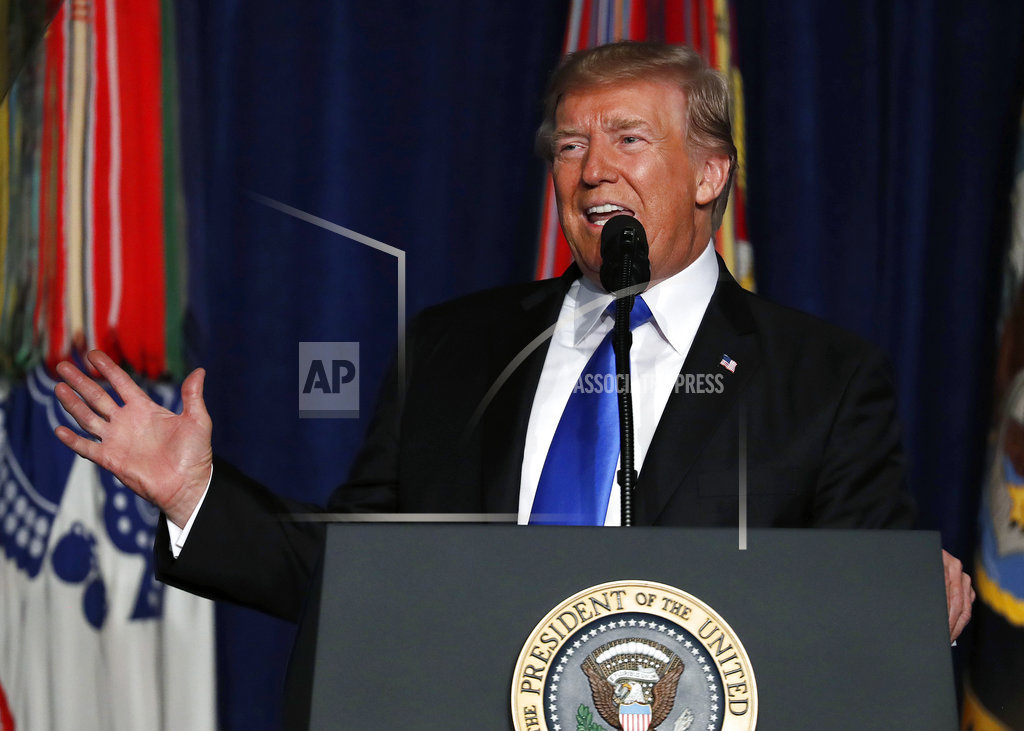
KABUL, Afghanistan (AP) — Afghans on Tuesday welcomed U.S. President Donald Trump’s harsh words for Pakistan in a speech outlining his strategy for the war-torn country that critics said offered little in the way of details and ruled out nation-building.
Abdullah Abdullah, Afghanistan’s second most powerful official behind the president, said in a news conference that the U.S. strategy marks a unique opportunity to ultimately achieve peaceful objectives in the region.
“The regional aspect of this strategy is very clear,” he said. “It shows that the problem was very well identified.”
Meanwhile, Trump said U.S. troops had a single-point agenda and that was to eliminate extremist fighters.
“We are not nation-building again,” he said Monday night. “We are killing terrorists.”
Trump accused Pakistan of giving extremists a safe haven, while next door in Afghanistan they kill U.S. troops. He said he wanted “immediate” results without saying what actions the United States might take against Pakistan if it ignored his warning.
But analysts in Pakistan warned that isolating Islamabad as the only culprit could increase the influence of regional players like Russia, China and even Iran.
Imtiaz Gul, executive director of the Islamabad-based Center for Research and Security Studies, said of Trump’s accusations: “This has been the same narrative for the last 15 years. He just upped the ante by being more belligerent or hostile.” Gul warned that the president’s words could drive a wedge deeper into a region that needs cooperation if it is to find a peaceful end to Afghanistan’s protracted conflict.
The U.S. and Afghanistan have routinely accused Pakistan — and particularly its powerful intelligence agency the ISI — of harboring insurgents and of waging a selective war, attacking those insurgents it considers its enemy and allowing those it has been known to use as proxies, either against hostile neighbors India or Afghanistan, to flourish.
Prior to Trump’s speech Monday, Pakistan’s military spokesman Maj. Gen. Asif Ghafoor refused to speculate on what the U.S. president might say, but said it was clear he anticipated criticism, saying: “There is no organized network of terrorists in Pakistan and actions have been taken without any discrimination against all terrorist organizations.”
A Kabul university professor and analyst Ahmad Zia Rafhat praised Trump’s harsh words directed at neighbor Pakistan.
“For the first time the Afghan people hear a clear comment from the U.S. president about Pakistan, especially that Trump mentioned very clearly that Pakistan is supporting and providing safe havens for terrorists,” he said.
Other Afghans interviewed by The AP in the capital Kabul expressed fears of a worsening situation in the country, bemoaning runaway corruption, high unemployment and increasingly deadly attacks. Several said Trump made it clear that he wasn’t about solving those problems.
Aziz Rahman, who works at a bank in Kabul, said Trump’s speech will make little difference to Afghans. After 16 years and tens of thousands of U.S. and NATO troops in his homeland, Rahman said the situation has only deteriorated with thousands of people fleeing.
“Trump’s speech is good for Americans, not for the poor people of Afghanistan,” Rahman said.
Waheed Muzhda, a political analyst in Kabul, expressed fear that Trump’s emphasis on a military victory seemed guaranteed to prolong the war and increase casualties.
“In the future we will witness a worsening of the war, more killing and more problems for the Afghan nation,” said Muzhda. “Mr. Trump only emphasized winning the war militarily, but if a military solution to the war could have been possible, this should have been achieved with presence of 150,000 troops.”
Meanwhile, the top U.S. diplomat in Kabul said President Trump made it clear that the U.S. “is not going anywhere,” but at the same time warning the Afghan government that it, too, has much to do if stability is to come to the country.
Special Charge d’Affaires at the U.S. Embassy Ambassador Hugo Llorens in a statement Tuesday urged the Afghan government to deal with widespread corruption, make good on a promise to hold parliamentary polls next year and enact tough economic reforms.
He also called on Afghanistan’s leadership to shed their ethnic differences and embrace each other.
Trump has not yet appointed a new ambassador to Kabul.



